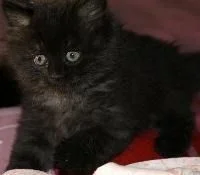Click on the links below to learn about a few of the commonly diagnosed conditions in our feline patients, or visit our Veterinary Library for a more extensive list.
- Chronic Kidney Disease
- Diabetes Mellitus
- Feline Hyperthyroidism
- Feline Lower Urinary Tract Disease
You can also read about the pros and cons of
- Indoor vs. Outdoor Cats
- Declawing Cats
If you have any questions, or think your cat may be affected by one or more of these conditions please schedule an appointment for a physical examination and other diagnostic tests by calling (516) 621-4010.

Update on Feline Vaccinations
Our pet’s health is extremely important to us. As a result, we try to do everything possible to ensure that they do not get sick. One of the most effective ways to prevent infectious diseases is to vaccinate our cats on a regular basis. This is why vaccinations are probably the single most important part of your cat's healthcare. Many devastating diseases are now almost completely preventable with the use of an appropriate vaccination protocol. When given properly, vaccines will protect your cat from serious, even fatal diseases.
We vaccinate for the following common feline diseases:

Chlamydophila (formerly known as Chlamydia)
Feline Chlamydophila mainly causes conjunctivitis in the cat. Infection is relatively common in cats, with up to 30% of cases of chronic conjunctivitis caused by this organism. Although cats of all ages can be infected, disease is seen most commonly seen in young kittens (5 - 12 weeks old) with persistent or recurrent infection.

Feline Distemper Combination (FVRCP)
This vaccine protects against 3 different diseases:
Feline Viral Rhinotracheitis - Rhinotracheitis is a severe upper respiratory infection caused by a feline type 1 herpes-virus. It is most severe in young kittens and older cats, and is one of the most serious upper respiratory diseases seen in the feline species. The virus is airborne and very contagious in susceptible animals.
Calicivirus - There are several strains of caliciviruses that affect the cat. They can cause a range of diseases, from a mild almost asymptomatic infection, to life-threatening pneumonia. Early signs are loss of appetite, elevated temperature and lethargy. Later, sneezing, oral ulcers and discharge from the eyes are seen.
Panleukopenia - Panleukopenia (also known as feline distemper and infectious feline enteritis) is a highly contagious disease characterized by a short course and high mortality rate. The disease is caused by a parvovirus similar to the parvovirus seen in dogs.The disease is most severe in young kittens, but can affect cats of all ages. Panleukopenia causes severe bloody diarrhea, anemia, immune compromise, fever, anorexia, vomiting, dehydration, abdominal pain, and is often fatal.

Feline Leukemia Virus
Feline leukemia is caused by a retrovirus that attacks the patient's bone marrow, leading to compromise of the feline immune system, leaving the patient susceptible to secondary disease. Feline leukemia remains un-treatable, with death the major consequence of infection. Given the imminent fatal nature of the disease, we advise yearly vaccination if your cat has direct contact with other cats, especially outdoor cats in contact with feral (untamed) neighborhood cats.

Rabies
Rabies is caused by a virus that attacks the brain causing severe dementia, aggression, and death once the patient shows clinical symptoms. Furthermore, no known treatment exists for rabies once the patient is showing clinical symptoms. Rabies is most commonly
transmitted via bite wound from an infected animal. Since humans can contract the disease if bitten by an infected animal, rabies has been deemed a public health hazard. Vaccination for rabies is a New York State law for dogs and cats, as well as ferrets.
Recommended Kitten Vaccination Schedule
8-9 weeks
Physical examination, Feline Distemper vaccine, blood test for Feline Leukemia and FIV (Feline Immunodeficiency Virus), deworming
11-12 weeks
Physical examination, Feline Distemper booster, Feline Leukemia vaccine #1 (if outdoor cat), deworming
15-16 weeks
Physical examination, Feline Distemper booster, Feline Leukemia booster (if outdoor cat), Rabies vaccine, deworming
Over 24 weeks
Repeat Feline Leukemia and FIV blood test if cat tested positive on a previous test
Additional Healthcare Recommendations
We recommend spaying and neutering your pet to minimize the risk of your pet developing mammary tumors, uterine infections, prostate disease, or testicular cancer. This procedure will also decrease the odor of the urine and decrease urine spraying in male cats. This procedure is usually performed between 6 and 9 months of age.
We also recommend the use of monthly heartworm, flea & tick preventative medications.
Recommended Vaccines for Adult Cats
Adult cats should have the following done yearly:
- Physical examination
- Feline Distemper booster
- Feline Rabies booster
- Feline Leukemia booster (if outdoor or at risk cat)
- Fecal flotation or general deworming (esp. if outdoor cat)
- Feline Leukemia and FIV blood test (if outdoor or at risk cat, or if cat becomes ill)
Naturally, since each cat has its own unique lifestyle and therefore exposure risk, the standard vaccination protocol will be modified for each individual cat.
If you have any questions or concerns regarding necessary tests or vaccinations for your cat please call the Roslyn-Greenvale Veterinary Group at (516) 621-4010 to schedule an appointment for an examination and consultation.

